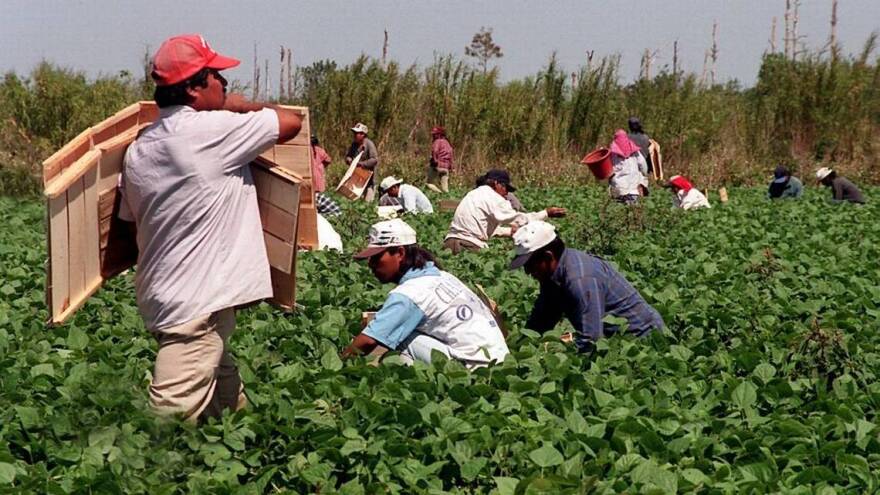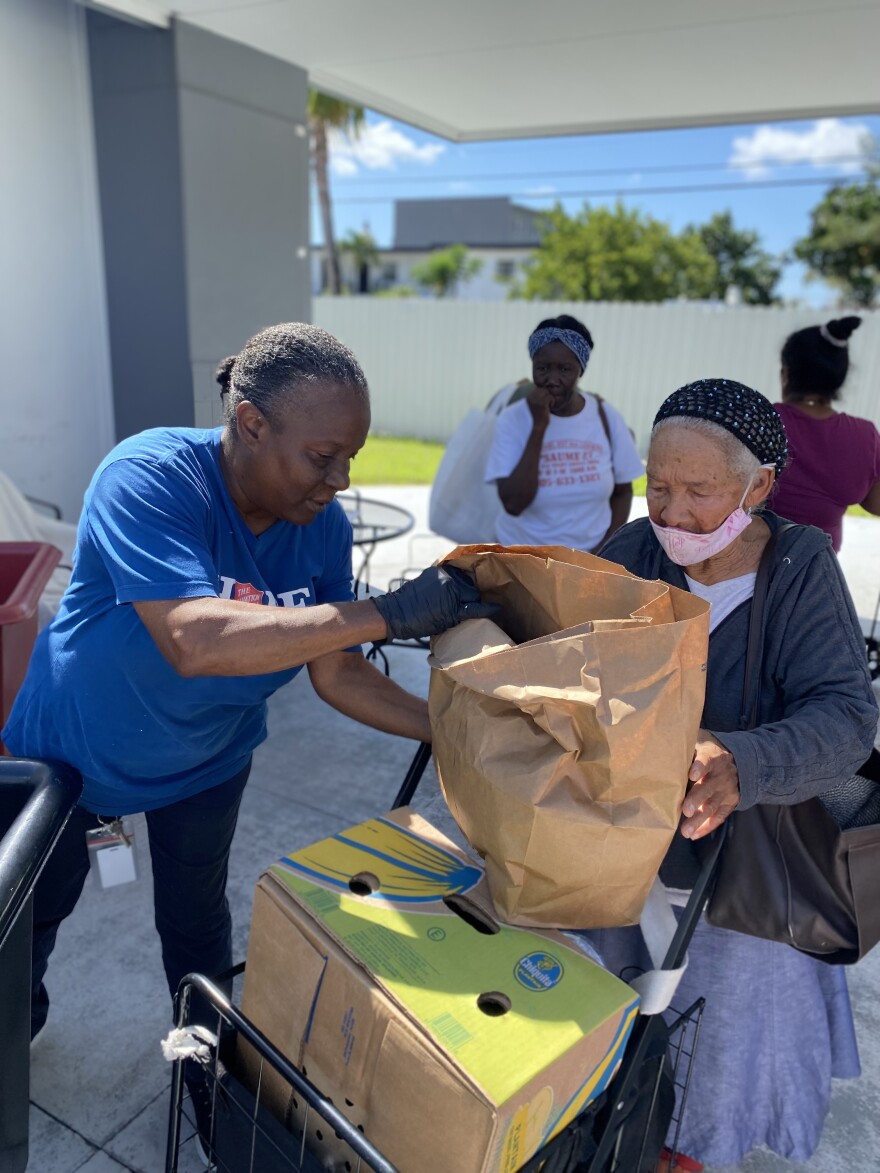The Salvation Army of Broward County received an urgent email late last month about their food deliveries from Farm Share, Florida’s largest independent food bank.
The news was not good. The U.S. Department of Agriculture had canceled 15 truckloads of food, limiting Farm Share’s food deliveries to twice a month instead of once a week, effective April 7.
The change has left the shelves of the Salvation Army of Broward County’s food pantry nearly empty and staff struggling to feed families dealing with food insecurity.
“For the last two weeks, we actually ran out of food before [noon],” said Lilly Gallardo, the director of program services at the Salvation Army of Broward County. “It's really sad because I know people that come expecting some food and we have to tell them, ‘Sorry, we don't have anymore.’”
READ MORE: Food banks are struggling as the Trump Administration cancels or pauses $1 billion in food programs
The budget cuts to the USDA is part of President Donald Trump’s broader effort to reduce federal spending and downsize government programs under billionaire Elon Musk’s Department of Government Efficiency, also known as DOGE.
The USDA has already made more than $1 billion in federal funding cuts and pauses to two programs: one that funds the purchase of local farm-fresh foods for school cafeterias and another that funds much of the product available in food banks.
The organization slashed $660 million from school food programs and $500 million specifically intended to help food banks and domestic agriculture. The latter came from the Community Credit Corporation, or CCC, branch of the Emergency Food Assistance Program, also known as TEFAP, which helps stock food pantries for families and individuals encountering food insecurity and living in food deserts.
The CCC gave the USDA some flexibility to use domestic farmers who faced certain hardships such as natural disasters or market conditions and provide additional food to TEFAP. Without it, food banks lose an additional source for produce, dairy and poultry, limiting the nutritional value of the meals that the food pantries provide.

Farm Share has been distributing food to nearly 2,000 partner agencies across the state since 1991. But as of April 11, the organization had a total of 63 truckloads of food canceled, equivalent to a little over $4.5 million worth of food products.
Due to the sudden decline in food supply, Farm Share has had to ration their food deliveries throughout Florida, limiting them to twice a month instead of weekly.
“We don't know yet whether or not that's going to be a long term cut or whether or not they'll reevaluate it and determine some other means to replace those foods,” said Stephen Shelley, Farm Share’s CEO. “But in the meantime, that's a huge volume of food that's being taken out of the system for us as a food bank, but also other food banks that are going through the same thing”
Farm Share distributes over 100 million pounds of food annually, receiving fresh fruits and vegetables from farmers, donations from grocery stores and other contributors, and food from USDA’s TEFAP. Shelley isn’t too worried about the funding pause and believes the organization would be able to get through it.
“We had similar issues for a little while in COVID,” said Shelley. “This is something that cyclically does occur and we usually make it through the other side. So I imagine we'll do the same this time as well.”

But the Salvation Army of Broward County isn’t so sure.
Before the federal budget cuts, the organization received a weekly delivery of non-perishables, produce, dairy and meat from Farm Share and United Way’s Project Lifeline. On Wednesdays, volunteers would package the food into grocery bags for each individual household. Then, on Thursdays from 9 a.m. to noon, families would line up outside of the organization’s building in Fort Lauderdale to collect their food for the week.
However, since Farm Share sent out an email changing their food delivery schedule, the Salvation Army of Broward County found themselves running out of food on multiple occasions.
The organization serves at least 240 families a week. But according to the United Way’s Asset Limited, Income Constrained, Employed, or ALICE, report, more than 100,000 households in Broward County live in poverty.
“If you come to our building at 7:30 or 7:45 in the morning, you're going to already see a line waiting for the food,” said Gallardo. “People need the food, and I will say that all of them are food insecure.”
Meanwhile, one of the Salvation Army Miami’s food pantries has seen an increase in community need for nutritious meals, but a sharp decrease in the number of perishable items donated.

The Center of Hope in Allapattah is located in a food desert, where residents have limited access to affordable, nutritious food sources like supermarkets or large grocery stores. This poses a challenge for those who lack transportation or are disabled and not able to travel far to buy fresh groceries.
The food pantry provides healthy meals to these Allapattah residents every Tuesday through Friday and partners with Publix, Feeding South Florida, Farm Share, Food Rescue US – South Florida and Copia.
However, they have also been impacted by the USDA cuts. Before, they would have a weekly delivery of dairy, eggs and other perishable food products. But over the last three months, there’s been a decrease in the items they receive.
Katelyn Pounds, the director of development at Salvation Army Miami, notes that the Allapattah food pantry sometimes receives poor produce from Farm Share. In other cases, the Center of Hope would run out of fresh produce to share by the end of the week because the items would expire quickly.
“We're seeing that our grocery recipients on Thursdays and Fridays don't have the same bulk of materials due to the lack of the fresh produce that's been available to us,” said Pounds.

At the same time, Pounds has found that more and more people in the community are coming to the food pantry to receive meals due to inflation and the increasing costs of groceries. The pantry typically serves 60 to 90 families each day that they share groceries.
“Rather than us serving 45 grocery packages daily Tuesday through Friday, we're seeing those numbers [increase] to 95, 110,” said Pounds.
To solve the problem, Pounds has been reaching out to individuals in the community and corporate donors who are able to donate either cash or food items to the Center of Hope. But while she hasn’t run out of food for families in the Allapattah community, she still looks for way to keep the Salvation Army’s food pantry afloat.
“Our Healthy Families Program not only provides meals for children, but also for our aging community who have been really hit hard with inflation,” said Pounds, “and working parents who are already working two to three jobs to try to buy groceries, but it's just not possible when you put three items in your cart and your total is already over $50.”
In the case of the Salvation Army of Broward County, Gallardo has been reaching out to other food banks like Feeding South Florida and asking their donors for bigger cash donations so the organization can purchase food from other suppliers.
The organization also has a food drive in their lobby where people could drop off extra cans of food for the pantry. But she still worries about how long she would be able to provide a full meal to the families that arrive for their share of food.
“Unfortunately, those who have less are the most affected,” said Gallardo, “and the people who are making decisions sometimes are not in tune with how painful it is for the everyday citizen.”
Those interested in contributing to the Salvation Army of Broward County, Salvation Army Miami and Farm Share can visit their websites for more information.





